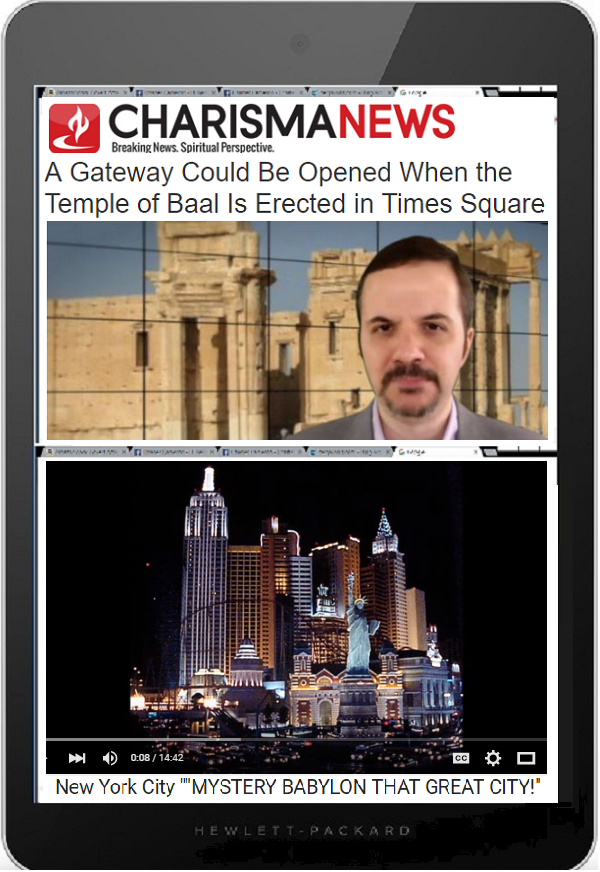Palmyra, the delirium
[ by Charles Cameron — any sufficiently advanced Stargate is indistinguishable from magic ]
.
**
I spoke too soon. In a post yesterday, I wrote of Palmyra, the grief and the joy. I should have known better — there’s always an end-times element to the news, particularly when it touches on the history of the Middle East.
In my tablet-format DoubleQuote above, you will find dire prognostications of one group of the apocalyptically aroused [upper panel, above] believing that the installation of a replica of the destroyed arch of Palmyra’s Temple of Baal in New York’s Times Square will unleash who knows what forces of evil upon the city — — a city which has in any case earned the sobriquet “Babylon” [lower panel] from others similarly apocalyptically aroused —
In ancient times, child sacrifice and bisexual orgies were common practices at the altars of Baal, and now we are putting up a monument of worship to this false god in the heart of our most important city.
April 2016: The Temple Of Baal Will Be Erected In Times Square In New York City
A tip-of-the-hat, here, to Richard Bartholomew of the Batholomew’s Notes on Relighion blog, who pointed me in this direction.
**
But there is yet time to take comfort, if you will, in the Dispensationalist theology supported by yet other end-timers discussed in this article, Are you ready for the counter-apocalypse? to which David Ronfeldt kindoy pointed me, proposing that things must inm any case “get worse before they can get better, theologically speaking —
Scofield, following Darby, taught that God governs and manages the world according to a sequence of distinct ages, or dispensations, each with distinct sets of rules and expectations. Each meets some kind of catastrophic end. In the Bible, as in Scofield’s life, things always got worse before they could get better—for instance, by Noah’s flood, or the destruction of Jerusalem’s Temple, or whatever social degeneracy we observe around us. Fear not, for God is in control. The job of believers is to accept whatever dispensation they’re in and await, like eager spectators, the next catastrophe.
Understanding sacred history like this has consequences for the present. Justice and peace need not be strived for now; we’re not in the right dispensation yet. Dispensationalists have held that even the beloved commands of Jesus in the Sermon on the Mount can be neglected—love your enemies, give what you have to those in need, do for others what you’d have them do for you.
As one of Scofield’s later followers reasoned, “Every businessman would go bankrupt giving to those who ask of him.” Dispensationalism permits a dose of pecuniary sense to some of the Bible’s more demanding social teachings.
This theology spread in tandem with modern corporate capitalism, aided by Gilded Age benefactors like California oilman Lyman Stewart. A later follower of Scofield’s imagined that Christians who persevere through the present tumult will get to serve as a “ruling aristocracy, the official administrative staff” of Christ’s corporate kingdom to come. The bureaucrat, thus, is the model believer: Play by the rules you’re given, as excellently as you can, and even as the planet is engulfed in flames rest assured that all is well.
**
I’d have far less to write about — and we’d all live in a safer world — if we recognized that the outrageous varieties of apocalyptic expectation just might be the multi-headed beast St John of Patmos was talking about in Revelation, ahem.




March 31st, 2016 at 2:31 pm
That gate in Times Square? Clearly, we need the gatekeeper and the keymaster…
https://www.youtube.com/watch?v=xSp5QwKRwqM
March 31st, 2016 at 7:31 pm
That bottom image is actually the New York-New York casino in Vegas, which, come to think of it, would probably be a much better location anyway.
.
The stories of ancient child sacrifice by Canaanites are similar to the ones the Romans told about Carthage – propaganda. The burning of children was probably casting aspersions on the ritualistic cleansing with incense. Recall the frankincense at the nativity.
The stories of sacred prostitution were clever defaming of the roles of priestesses and fertility rituals.
Just as the case of the infants dashed against the rocks in Psalm 137, it’s all not to be taken literally.